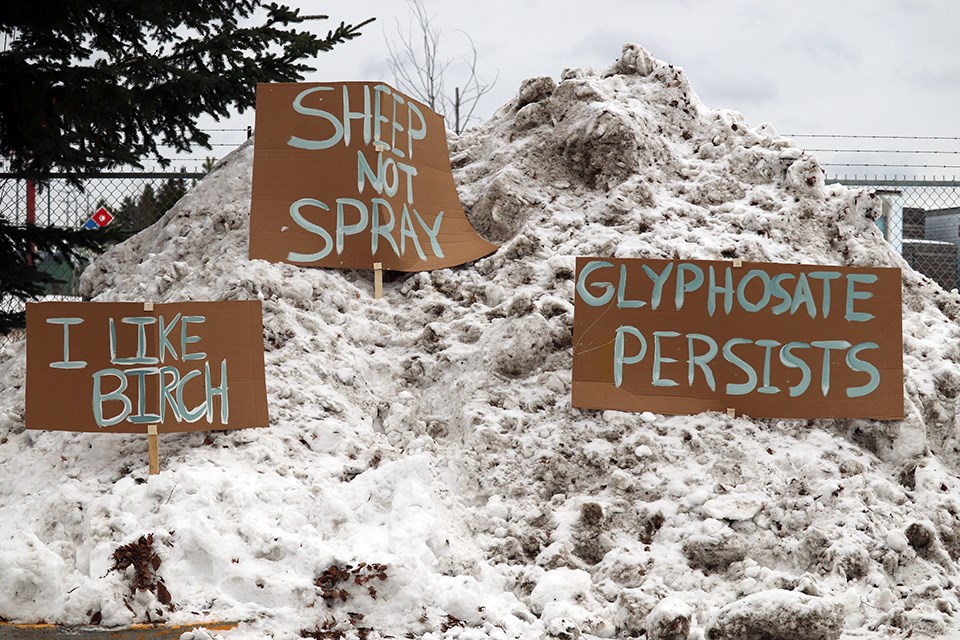A rally calling to stop the use of glyphosate on local forests assembled in front of the BC Ministry of Forest Office in Prince George today (Nov. 12).
Despite the cold weather, more than 50 people, including Prince George-Mackenzie MLA Mike Morris, and former BC Greens candidate Mackenzie Kerr, attended the rally on Ospika Boulevard.
Organized by Stop the Spray BC, the group is calling for a halt to five more years of broadcast aerial spraying of the pesticide.
Canfor is in the process of renewing its five-year Pest Management Plan, which designates deciduous native tree species like birch, cottonwood and aspen pests and allows cutblocks near Prince George to be sprayed with glyphosate which curbs competition for young coniferous trees.
“We are basically standing up for diverse forests, we are standing up for moose food, we are standing up for beaver food, we are standing up for fire-resistant forests,” says James Steidle spokesperson from Stop the Spray BC during the rally.
“There is no requirement for these companies to listen to any concern or consideration that the public may have.”
The pest management plan was open for public comment until Tuesday (Nov. 10), but came into effect thereafter regardless of any comments submitted.
“This isn’t about Canfor. It’s about the rules and regulations the government has put in place that need to change and they are simple to change,” says Steidle.
“Why are we paying for this and who said we should be giving this money for this purpose? We want to shine a light on these unaccountable decisions being made with our tax dollars.”
Stop the Spray BC says the public cost to spray tens of thousands of hectares over five years adds up to about $10 million.
PG rallied today to demand a stop to the spraying of glyphosate on local forests @stopthespraybc #cityofpg pic.twitter.com/JjRcmifNpu
— Hanna Petersen (@hannaepeter) November 12, 2020
A glyphosate ban has political support
“I have seen the cumulative effect of glyphosate use over the last 25 or so years or more to the point where there’s no wildlife in those areas that have been sprayed,” said MLA Mike Morris, who also spoke at the rally.
“We are destroying so much habit so quickly with forestry just by spraying glyphosate at the end of the day and we have to adjust how we do things quickly.”
Morris also said B.C.’s sustainable harvest strategy needs to change from volume-based logging to an ecology-based forestry model for the province.
“The support that we see here today is great and I think the support is increasing right across the province here,” added Morris.
“I get constant emails and messages in my office daily from people who support getting rid of glyphosate.”
Mackenzie Kerr, who recently ran for the BC Greens in October’s provincial election for the Prince George-Valemount riding, said unsustainable forestry practices is what first got her into politics.
“I am really passionate about banning the spraying of glyphosate. This is the highest sprayed area of the province and it’s all because of short term profit thinking and not long term ecosystem-based management thinking,” says Kerr.
“There’s a lot of changes we need to make and I am really happy to see such great turnout today and so many people that are interested in this.”
Research points to lingering impacts of spraying forests
UNBC's Dr. Lisa Wood is currently studying the long-term impacts of glyphosate-based herbicides.
Her research has found the ability of glyphosate to be stored in root structures of perennial plants during dormancy periods, and move up to shoot and fruit portions in years following applications in some species.
“What Dr. Lisa Wood at UNBC found was actually glyphosate doesn’t disappear and if they do a non-lethal dose on vegetation that surviving vegetation will maintain that glyphosate indefinitely as long as that plant is alive,” says Steidle.
“All of the [previous] studies they have done just say ‘look at how much better the spruce trees grow if we get rid of the competition’ and they are not looking beyond that. It needs to change.”
At the end of the rally, Stop the Spray BC delivered a letter to the BC Ministry of Forests Office addressed to district manager John Huybers and regional executive director Greg Rawling demanding an explanation.
“We demand an explanation for why your office is declaring perfectly good tree species as non-commercial when we have no idea what a commercial tree is 60-years down the road,” states the letter.
“In this day and age we need jobs, we need sustainable forestry, and we cannot afford to turn our forests into monoculture wastelands. Forestry is the backbone of this community and it has to be done right. And it’s not being done right.”



